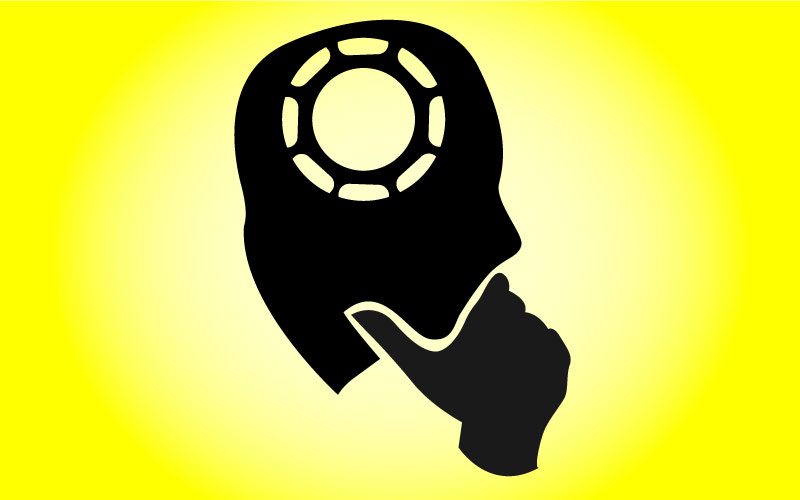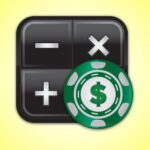Balance by Meeloche
Simple Definition as it applies to poker: Taking the same line as a bluff as you would for value, example a cbet on an AK9 board with 78o.
The point is not to bluff 50% of the time and value bet 50% of the time on the example board, but to credibly represent a hand in your value range every time you bluff. As you move up in stakes and you begin to play against people who are thinking about more details than the colour of their cards you have to play in a way that they cannot exploit you. Basic example: A TAG villain opens from the CO and you call out of the BB with a certain range. The flop comes 2s7h8h. You check because that’s what you do with your entire range of hands. TAG villain cbets for ¾ of the pot. If you only c/r here with 88, 77, 78 and 22 (which are definitely in your range in the BB), you are exploitable. By doing this you allow villain to play perfectly against you. He can cbet this board 100% of the time and make a profit because he knows the only time you c/r is if you have a set or top 2 and if you call you either have a weak made hand or a draw which he can barrel you off of on appropriate turn and river combinations. When you widen your c/r range on this board to include draws, over pairs, tptk and air, villain is in a much more difficult spot. The basic adjustment is that he will usually make is to do 2 things. He will play his nutted hands very aggressively and the rest of his range passively. This change in behavior helps you play perfect against him with your range of hands.
Mid-Stakes and High stakes poker is a game of adjustments. In the above paragraph I talked about a simple example of how widening and balancing your c/r range on a certain board texture creates a difficult situation for villain and forces him to play his hand in a way that is easy to read. When you meet villains that have this knowledge already they are going to be adjusting to this. This brings perceived ranges into the equation and my next point.
Being perfectly balanced in all situations isn’t always the most +ev situation. There are situations where I don’t need to have air in my range because villain assumes that I have air in my range so my nutted hands still get paid off. An example of this is in blind versus blind dynamics versus aggressive mid stakes regulars. For example: it is folded around to me on the button and I open to 3bb. The SB folds and an aggressive regular who can be spewy at times 3 bets to 10bb. What I know about the villain is that he is very aggressive preflop. I know that he is aware that I’m raising a wide range on the button and that he knows that I know that this is a good spot for him to 3 bet me light. Therefore this is a good spot for me to 4 bet him light and he knows this. I know this particular villain will assume that I have air in my 4 betting range based on my preflop stats and the fact that I am a regular and open a wide range on the button. This would not make it a profitable 4 bet bluff spot since he is liable to 5 bet jam on me with a wideish range. The EV that I would gain by him knowing that I can have air here is lost because he already thinks that I have air in my range. So I can fold all the hands that I don’t want to felt and 4 bet only my value range. I don’t need to balance my 4 betting range in this spot because my perceived range already has air in it.
When you are thinking about balance you have to realize there is a lot more to it than just taking the same lines for value and for bluffs. When playing against thinking players looking to exploit you, your perceived range is much more important than your actual range. As you play with good players more who are adjusting to your actual range as they learn about it, you can modify it in a way to exploit them. Unlimited holdem is a complicated game, but as long as you are adjusting to others players’ range and exploiting them, you will always be +ev.
Balance (unexploitability) by Noble
In this definition I will attempt to explain what balance is & why it becomes more important to understand it as you move up the limits.
When you first start playing poker you don’t learn or aren’t taught a lot about ‘balance’ because at the micro limits your average opponent is only thinking about poker at a very basic level – ‘What hand do I have?’ They are also far too loose, this means in order to earn $ you basically just have to wait for good hands and then value bet the shit out of them.
However, when playing this style of poker your range actually becomes very ‘un-balanced’ because when you check you are usually weak and when you bet or raise you are usually strong.
This only becomes a problem though as you move above the micro limits and encounter better players who are thinking about poker at a slightly higher level – ‘What range of hands does my opponent have?’
These players are capable of exploiting your un-balanced range by often bluffing you when you check and getting away from a lot of marginal made hands when you show strength.
Your range can also be un-balanced in a multitude of other ways both pre and post-flop.
Eg. If you only 3bet KK & AA pre-flop your range is very un-balanced and it allows players to exploit you by being able to get away from hands like TT-QQ/AK that you should be getting alot of value out of.
Even the entire lines you routinely take with specific hands can be said to be ‘un-balanced’.
Eg. If you only check-call flop check-call turn when you have a flush draw your range is very un-balanced and you’re unlikely to get paid off if you hit on the river.
So now if you don’t want to go broke you have to learn how to ‘balance’ your range vs these players. For example, sometimes you will check your good hands and sometimes you will bet or raise as a bluff so that you can’t be exploited as easily. In fact, by looking at the pot odds your bet is offering your opponent you can determine the optimal ‘bluffing frequency’ and by balancing your range at this frequency it is possible to make yourself nearly ‘unexploitable’ in a lot of situations.
Eg. You shove your last $100 into a $100 pot on the river.
To call you your opponent needs to have a better hand 33.333% of the time. (Because 2/3 times he will lose $100 and 1 time he will win $200.)
So, if you balance your range in this spot so that you are bluffing 33.3% of the time and have a better hand than your opponent 66.6% of the time you make yourself unexploitable, because at this optimal bluffing frequency, even if your opponent chooses the best option vs your range, the best he can hope to do long term is break even.
So is this what you should be aiming for as you move up the limits – perfect balance & unexploitability?
Well for a while I thought the answer was yes and I devised a pre-flop strategy that made me almost unexploitable, but thanks to input from some of the more experienced players on FTR I learned that being unexploitable doesn’t neccesarily make you the most $ and poker is all about maximising your $!
No, if you want to be more profitable vs these level 2, ‘what range of hands does he have’ players then you need to think a level above them and ask yourself, ‘what is my perceived range vs this player?’
Then when you are considering a pot size shove on the river as in the example above, you should be able to decide whether he will think you are value-betting more than 66.6% of the time in this spot.
If the answer is yes, your opponent will fold more than 33.33% of the time, in which case you should ‘un-balance’ your range by bluffing more to exploit this. If you think your opponent will call too often, you should value bet more frequently.
So thanks to FTR I have learned how to balance my range and then, once I understand how my opponent is likely to perceive my range, how to un-balance it in order to take the most +ev line.
I hope from this definition you will see that having an understanding of balance and why playing a more balanced range is important as you move up the levels, but that it is only a base from which to work so that you can avoid being exploited and then figure out how best to exploit your opponents. A case of understanding the rules so that you know how to break them.
Submit your review | |









